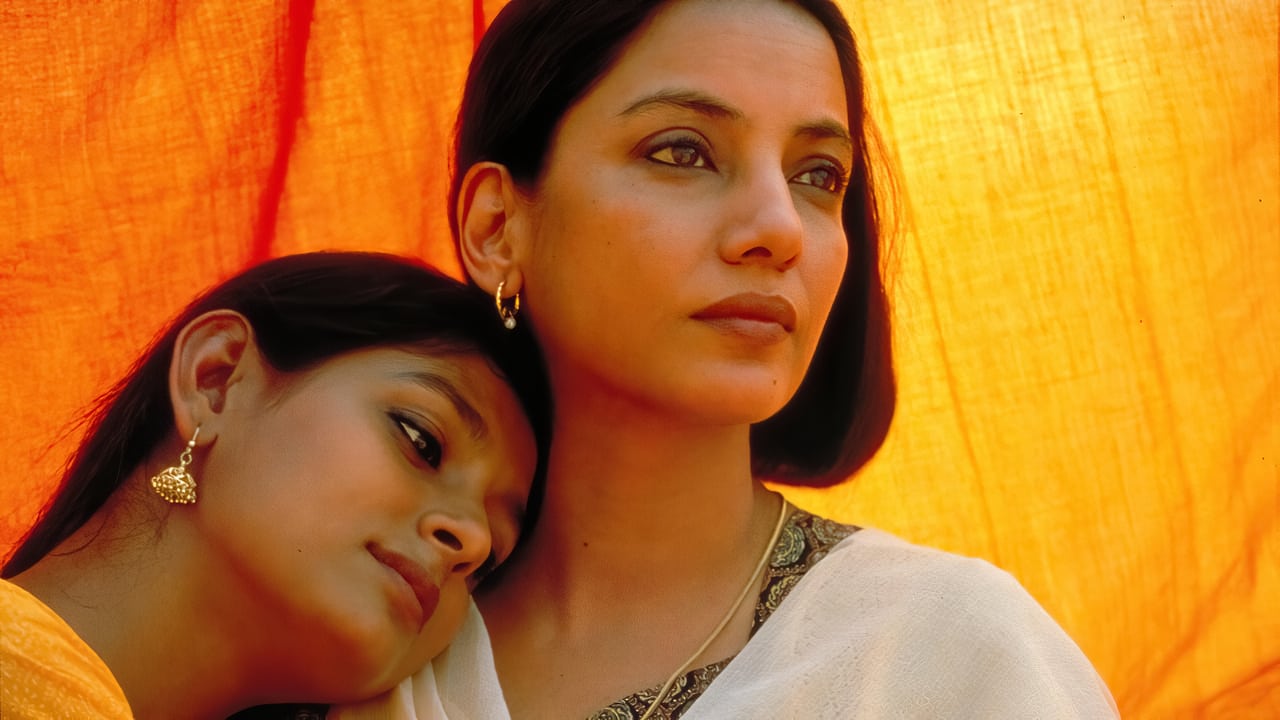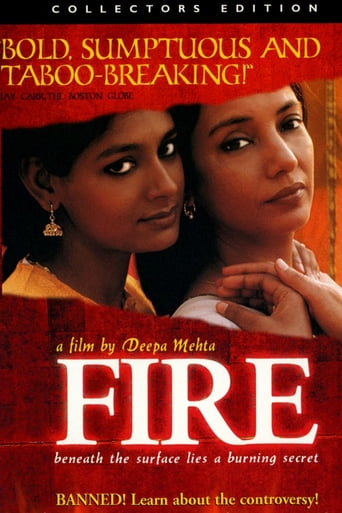

Bold, controversial and taboo-breaking are among the many attention-grabbing words that have been used to describe 'Fire' and this has no doubt helped the film gain recognition. However, I feel that such adjectives undermine the true beauty of that is depicted in this picture. It deals with many themes such as feminism, affection, love and freedom and at the heart of the film lies the relationship between Seeta and Radha. The bond between them is portrayed with such innocence, tenderness, affection and sensibility that its beauty stands out. The growth in the two characters and the development of their relationship is splendid to watch. While the relationship is portrayed with sensuality, there is no titillation or overt skin exposure.Due to the theme of homosexuality and the questioning of religion, 'Fire' was ridiculously banned in several countries. It is never specified whether Seeta or Radha were exclusively homosexual. They're never shown to not enjoy a sexual relationship with their respective male partners. Radha has made numerous attempts over the years to have that kind of intimacy with her celibate husband but he's the one who refuses while in Seeta's case, sex is a mechanical thing for her husband. What they Seeta and Radha find in each other is affection, love, desire and tenderness, something they yearned for but never had with their husbands.Many have argued that Deepa Mehta deliberately uses shock value and portrays India as repressed in order to make her film appeal to the Western audience. I don't know whether that was her intention with 'Fire' but to me it felt like an honest movie and the problems portrayed in this film are still very much a reality in India. I would even go as far to say that this is among Mehta's best works. Her use of metaphors is brave and gives the film a poetic feel.Mehta's films have often scored high in the technical department and 'Fire' is no different. Here the cinematography and A.R. Rahman's score particularly stand out. The music is mesmerizing. The art direction too is brilliant.Luminous Nandita Das is terrific as the young, vivacious and energetic Seeta. Shabana Azmi is once again transcendent. Her nuanced, quiet and restrained performance easily touch on the heartstrings. Kulbhushan Kharbanda and Javed Jaffrey provide good support.Forget all the labelling, controversial or not 'Fire' is worth seeing for the beauty it portrays when two people find love and freedom in each other.
... View MoreThere are many plot points which were easy to see coming, which is the fault of the screenplay by Mehta. But the film is far too suffused with politics to approach greatness, even were it better written. It is not as overtly preachy and hammy as Brokeback Mountain, but it does make excuses for its adulterous lesbians, just as the Hollywood film basically makes heroes out of lying lowlife bastards. As example, while Jatin is certainly a fool and cheater, and Sita owes him no allegiance, the same cannot be said of Radha, for Ashok is certainly a devoted and loving husband. If she was not getting what she wanted, it was her right and duty to speak up and demand change, or leave with honor. His response to her barrenness may have been silly and wrong, but it was not accomplished without her complicity. Radha, in this sense, is the villain of the film, for while Jatin is a letch, he is shown as utterly void of depth. Mundu is a slimebag, but an insignificant little bug. But Radha has the ability to think and choose. She does not merely fall into her relationship with Sita, she chooses its deceptions over her first allegiance to her husband. If she wanted out or change, she should have spoken up, for the energy and will she displays in leaving him could have earlier been displayed within her marriage. Thus, she is an agent of the ill that befalls the family, not a victim, the way the naïve and forcefully betrothed Sita is.The other aspects of the film are well done, such as the musical soundtrack by A.R. Rahman, and the cinematography by Giles Nuttgens, but nothing that approaches greatness. The DVD, put out by New Yorker Video, has the 108 minute version of the film, and is shown in a 1.85:1 aspect ratio. There is no audio film commentary, but there is a theatrical trailer, cast profiles and production notes, and a documentary on the controversy the film caused in India, which led to its banning. All in all, it shows Indian culture in a very silly and puerile light.That said, the film, aside from its objective artistic flaws, also suffers from an insular take on its culture. To the non-Indian, as example, there are many political points meant for Indian society, alone, that are lost outside that milieu, and without these touchstone hot buttons as references, the film's political relevance fizzles- the best example being Sita's and Radha's names being based upon Hindu goddesses, and Sita being purged by fire- although in the film it is Radha who is purged by fire; a point Indian film critics lash out at, but which seem silly criticisms to foreign ears. Yet, ultimately, what causes Fire to only reach passable mediocrity as a film is the more immanent artistic flaws of screenplay, characterization, and political imposition. It is a film that is solid, but nothing worth viewing a second time, save for glimpsing the two gorgeous lipstick lesbians. Not that that is a bad thing, of course, but why not try Penthouse, instead? At least there you won't be subjected to puerile political statements.The film is the first of a trilogy of films, and was followed by Earth and Water, which seem to be less 'controversial,' as well as less pointedly provocative. Whether or not this equates with a genuine upgrade of the art is something to be seen, but there is potential here. It's just that Mehta's desire to make a cogent statement so overwhelms her desire to make it endure to future generations, and outside its natal setting, that this film fails. Rein that in, and she has the makings of an artist of consequence. I'll be watching.
... View MoreI admire Deepa Mehta and this movie is a masterpiece. I'd recommend to buy this movie on DVD because it's a movie you might want to watch more often than just once. And trust me, you'd still find little meaningful details after watching it several times.The characters - except for the grandmother perhaps - are all very balanced, no black and white. Even though you follow the story from the perspective of the two protagonists, there is also empathy for the other characters.I think the IMDb rating for the movie is far too low - probably due to its politically controversial content.
... View MoreA fairly interesting look at some characters from India's burgeoning middle class. Although India is rapidly modernizing, her culture is not keeping up. This film involves the patriarchal society, where women are not yet truly free citizens. A land of arranged marriages, men who dally with mistresses with total impunity, and women who are expected to tolerate all this, will eventually come up short. I was impressed with Nandita Das, who was quite attractive, and played her character with total earnestness. But I was even more impressed with Shabana Azmi, who I understand is a long-time fixture of Bollywood. Her quiet beauty and low-key psychic suffering was excellent. The lesbian subtext of this film was never particularly erotic, and never titillating. (Darn!) Worth a look for those interested in vastly different cultures.
... View More